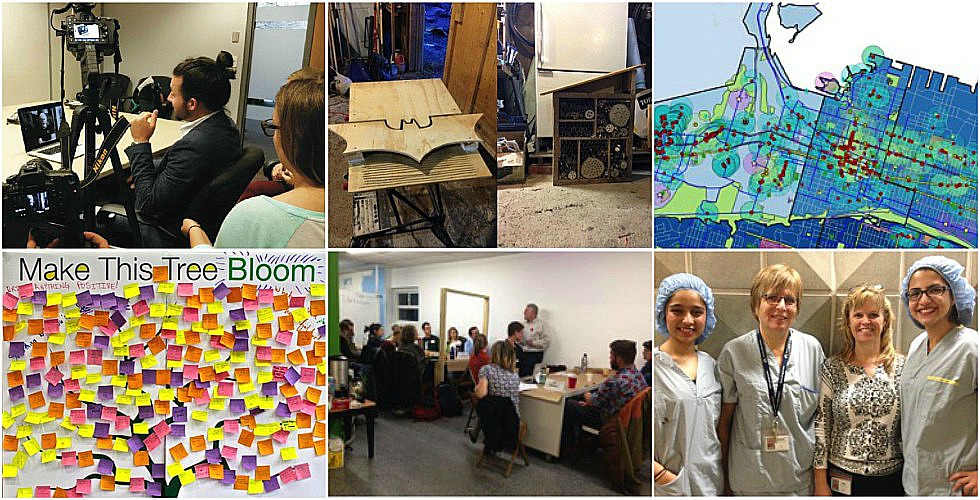Unique programs offer students hands-on opportunities to learn about sustainability

Images from some of the student-led experiential learning projects contained in the 2015/16 Academic Sustainability Programs Annual Report. Projects include (from top left) Sustainable Joes: Making Sustainability Easy, Small Farm Biodiversity and Pollinator Habitat, Hamilton Bike Parking Inventory Analysis, (from bottom left) Random Act of Kindness Day: McMaster Outreach, Supporting the Formation of Cycle Hamilton, Waste Management at McMaster Medical Centre.
Finding ways to increase biodiversity on local farms. Promoting art in the public realm. Challenging attitudes toward food waste on campus and beyond.
These are just a few of the interdisciplinary, community-based, experiential learning projects* completed in 2015/16 by students in McMaster’s Academic Sustainability Programs– programs, that according to the Academic Sustainability Programs Office Annual Report, have seen significant growth in recent years.
The report provides updates on the Office’s five programs which include the Interdisciplinary Minor in Sustainability, the Sustainable Future Program, the Sustainability Internship Program, Community-based Leadership in Sustainability, and the Graduate/Undergraduate Collaboration in Experiential Learning (GUCEL) program.
The programs are intended to provide students with opportunities to develop and lead experiential learning projects on themes related to social, environmental and economic sustainability, while working with and learning from communities, both within and outside of McMaster.
“Our goal is to inspire in students a desire for continued learning and inquiry through experiential education,” says Kate Whalen, senior manager of sustainability programs. “We have seen increased interest in these programs in the past few years and I have been deeply impressed by the work produced by our students, by their increasingly unique and diverse connections to sustainability, and by the meaningful community collaborations they have formed through these projects.”
According to Whalen, advances have been made in each of the programs over the past year, notably in the Sustainable Future Program– offered in partnership with the Engineering and Society program– which, over the past three years, has grown from one course supporting 100 students to three courses supporting 300 students. To meet increased demand, capacity was doubled in the level one course and a full-year level-four course focusing on large-scale project implementation was developed.
Whalen also points to the success of the Sustainability Minor, which is supported by the Arts & Science program, and enables students to choose from more than 60 courses offered by a range of Faculties. Since its launch in 2014, dozens of students have either declared, or graduated with, a minor in sustainability.
“Issues related to sustainability are among the most pressing challenges facing society today,” says Jean Wilson, director of the Arts & Science Program. “Finding solutions to these problems requires an interdisciplinary mindset, an ability to look at sustainability from a range of perspectives. The Interdisciplinary Minor in Sustainability provides a path for students to study and understand these complex issues and equips them with the skills they’ll need to continue to address these challenges after they graduate.”
*Student-authored descriptions of all the student-led, experiential learning projects can be found in the Academic Sustainability Programs Office Annual Report 2016-16.
Read more about the student-led sustainability projects:
Communicating Sustainability in a Health Care Setting
Ahmad Zybair Banoor, Josua Del Gobbo, Srishti Harnal
This project focused on increasing communication about sustainability in a healthcare setting.
Working alongside the Sustainability & Waste Management Coordinator at St. Joseph’s Healthcare Hamilton, the students created a package of informative posters that would help hospital staff to further understand proper recycling and waste disposal practices.
“We learned that an elephant’s weight (or 2.5 tonnes) of waste is produced on average at the Charlton campus every day,” write students Ahmad Zubair Banoor, Joshua Del Gobbo, and Srishti Harnal. “After we designed the informative posters, we completed a recycling audit to understand if the newly implemented operating room recycling containers and info-posters are effective.”
The group found that operating rooms without info-posters produced 62.3% more recycling waste than the operating rooms that had info-posters on the hampers.
Small Farm Biodiversity and Pollinator Habitat
Hussain Abbas, Duncan Chambers, Liana Glass, Juc Hains, Jordan MacCarthy-Tilly
This project aimed to increase biodiversity at Common Ground Teaching Farm, a small-scale organic farm in Mount Hope, Ontario.
“We began by conducting a survey of the cultivated and bordering land in order to summarize the species of plants, insects, and other fauna that make up the farm’s ecosystem”, write students Hussain Abbas, Duncan Chambers, Liana Glass, Luc Hains, and Jordan MacCarthy-Tilley. “From this knowledge base, we were able to research other native plants that would further enhance the ecosystem. We chose plants that would attract certain pollinators or predators of pest insects.”
The group also built a bee hotel and a bat house to foster a more resilient and productive farm ecosystem.

